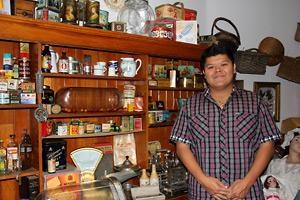This summer, parents can feel great about dropping their children off at summer camp. For the first time in 12 years, Powell River Historical Museum and Archives will be holding five week-long summer educational programs focusing on local and aboriginal history.
Targeted at ages seven to 12, the Hands on History program aims to teach children about the history of Powell River in a fun way.
Brandon Peters, one of the program’s developers, explained there will be an emphasis on the Tla’amin (Sliammon) First Nation people.
“Local aboriginal history is something that’s kind of left on the back burner,” said Peters. “They do learn a little bit in grade four, but a lot of the time, kids can’t even name what tribe the local aboriginal population is.”
Peters said he hopes the program will give children a better understanding of the lives of pioneers and aboriginals in the Powell River area.
The first two days of the program will be centred around Tla’amin history and culture, Peters explained. The next day will be devoted to geography and forestry, centring on why Powell River was founded. The fourth day will explain the history of the paper mill and its environmental and economic impacts.
Peters said the final day will be less education-based. “We call the last day the Good Old Day.” Pioneer methods will be compared to modern-day convenience items, allowing children to experience doing things the old-fashioned way.
“We’ll be bringing in old-fashioned quill pens and comparing them to ballpoints,” he explained. “We’ll also be making ice cream and butter.” Finally, as a present to their parents, the children will make bannock dough to take home and bake.
Arts and crafts are a large part of the program and include painting with coffee, making paper and even making yarn. “Our accountant raises a very rare breed of baby doll sheep, so we thought it’d be really fun to spin wool from them,” said Peters.
The program will also involve tours of both the museum and Powell River Forestry Museum as well as exploring the shoreline. “All the activities are really neat,” said Peters. “I mean, coffee painting? Who thinks of that?”
The educational aspect of the program will be very attractive to parents, as the entire program is developed to match up with learning outcomes in the BC education system, Peters explained. Peters will even be teaching the older children how to read phonetic orthography, a series of symbols developed at the University of British Columbia (UBC) to record the sounds of the aboriginal languages not in the European alphabet.
“It’s a great way to keep the academic juices flowing before school starts,” Peters said, laughing.
One thing he especially wants the children to take out of the program, said Peters, is that aboriginal people are very diverse.
“Most of them have that Hollywood understanding of aboriginal people, that we all wear braids and leather, but in reality, there’s over 600 bands and 200 languages in Canada,” Peters explained. “I want to instil that each band and each culture is unique.”
The museum was able to run the program this year because of a government grant, Peters said. This grant will also be used to develop a seniors’ outreach program and to collaborate with aboriginal elders on new exhibits.
Peters said he wants people to realize what an interesting place Powell River is. “I’ve heard so many times that people don’t even know we’ve got a museum in town,” he said. “But whenever I do a tour and start explaining things to people, they get very excited about it. They’re like, ‘Oh, I didn’t know that.’”
If the program is successful enough, Peters explained, it will be returning next summer. “I will have graduated from UBC and I’ll be too old to run the program again,” he said sadly, “but I’m very proud to be involved in this project. It’s a unique opportunity for any parents who want their children to understand the town that they’re living in.”
The first session of the program starts on Monday, July 16, and the final session ends Friday, August 17. For more information or to sign up for the program, readers can call the museum at 604.485.2222.



